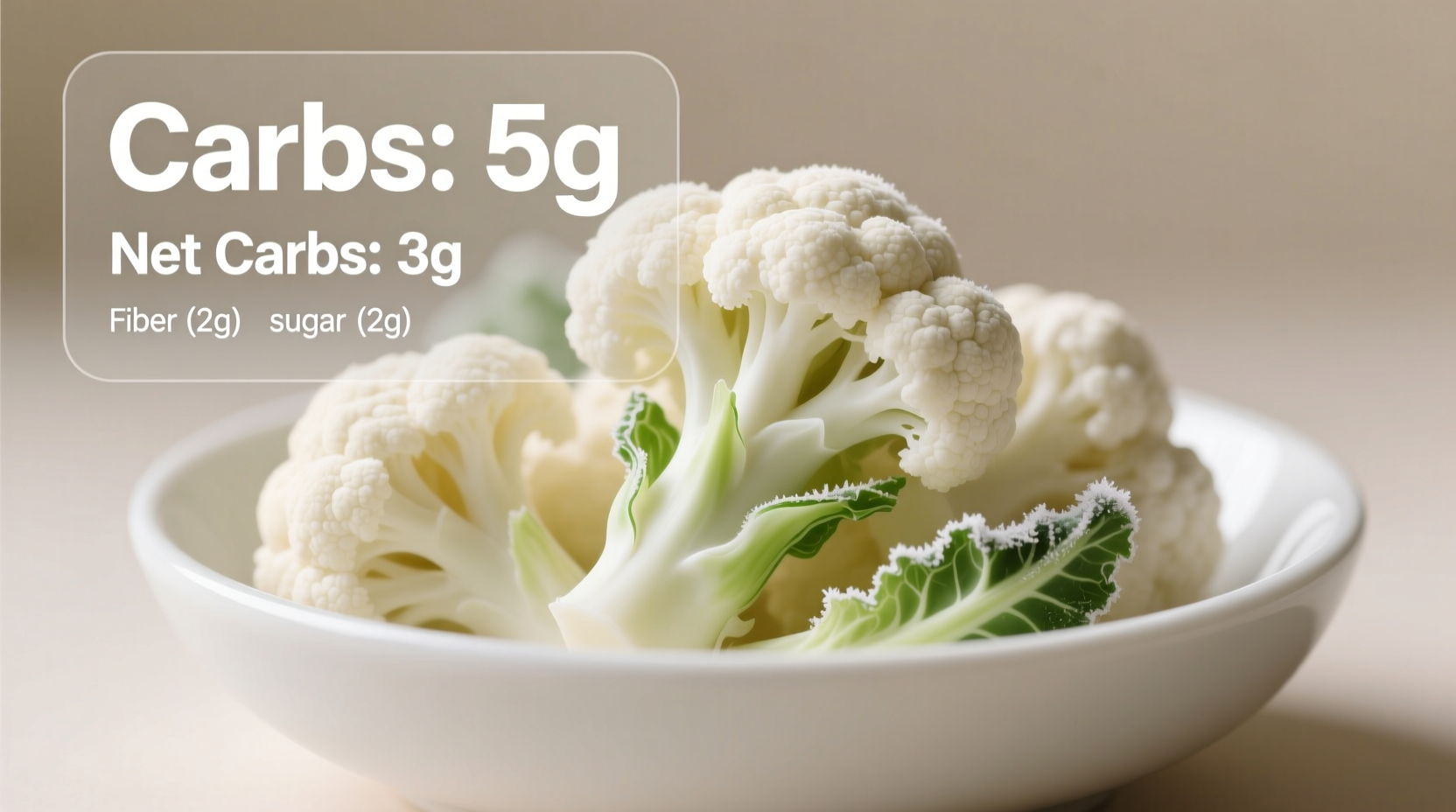Understanding Cauliflower's Nutritional Profile
When tracking your carbohydrate intake, knowing the precise nutritional content of common vegetables is essential. Cauliflower has gained significant popularity among health-conscious eaters and those following specific dietary protocols due to its remarkably low carbohydrate content relative to its volume and versatility.
According to the USDA FoodData Central, the official source for U.S. nutritional information, the carbohydrate composition of cauliflower is particularly favorable for those monitoring their intake. The fiber content represents 40% of the total carbohydrates, which contributes to its excellent nutritional profile.
Carbohydrate Breakdown: Total vs. Net Carbs
Understanding the difference between total carbohydrates and net carbohydrates is crucial for many dietary approaches:
- Total Carbohydrates: 5g per 1 cup (100g) raw cauliflower
- Dietary Fiber: 2g (40% of total carbs)
- Sugars: 2g (naturally occurring)
- Net Carbs: 3g (total carbs minus fiber)
This breakdown matters significantly for individuals following ketogenic diets, managing diabetes, or simply tracking their carbohydrate consumption for health reasons. The high fiber-to-carb ratio makes cauliflower particularly valuable for digestive health while keeping net carb counts low.
| Vegetable (1 cup) | Total Carbs (g) | Fiber (g) | Net Carbs (g) | Calories |
|---|---|---|---|---|
| Cauliflower (raw) | 5 | 2 | 3 | 25 |
| Broccoli (raw) | 6 | 2.4 | 3.6 | 34 |
| Spinach (raw) | 1.1 | 0.7 | 0.4 | 7 |
| Carrots (raw) | 12 | 3.6 | 8.4 | 52 |
| Peas (cooked) | 16 | 8.8 | 7.2 | 118 |
Nutritional comparison of common vegetables per 1 cup serving based on USDA FoodData Central data
How Preparation Methods Affect Carb Content
While the raw nutritional profile is important, how you prepare cauliflower can impact its carbohydrate density:
- Raw: Maintains the standard 5g total carbs per cup
- Steamed: Minimal change to carb content, though volume decreases slightly as it wilts
- Riced: 1 cup of cauliflower rice contains approximately 4g total carbs (3g net)
- Roasted: Slight concentration of carbs as moisture evaporates, but difference is minimal
- Creamed or mashed: Additional carbs may be introduced from added ingredients
Unlike starchy vegetables such as potatoes or corn, cauliflower's carbohydrate content remains consistently low across preparation methods, making it remarkably versatile for various dietary needs.

Practical Applications for Different Dietary Goals
Cauliflower's low carbohydrate profile makes it suitable for multiple dietary approaches:
Ketogenic Diet Support
With only 3g of net carbs per cup, cauliflower fits comfortably within most ketogenic diet parameters. It's become a popular substitute for higher-carb foods:
- Cauliflower rice instead of grain-based rice (saves ~45g carbs per serving)
- Cauliflower mash instead of potatoes (saves ~30g carbs per serving)
- Cauliflower crust for pizza (saves ~35g carbs compared to traditional crust)
Diabetes Management
The American Diabetes Association recognizes cauliflower as a non-starchy vegetable with minimal impact on blood sugar. Its high fiber content helps slow glucose absorption, making it an excellent choice for blood sugar management.
General Weight Management
With just 25 calories per cup and high water content (92%), cauliflower provides volume and satisfaction with minimal caloric impact. This makes it valuable for those seeking to reduce overall calorie intake while maintaining feeling of fullness.
Maximizing Cauliflower's Nutritional Benefits
To get the most nutritional value from cauliflower while maintaining its low-carb advantages:
- Store properly: Keep whole heads in a paper bag in the refrigerator crisper drawer
- Wash just before use to prevent premature spoilage
- Steam lightly rather than boiling to preserve nutrients
- Pair with healthy fats like olive oil or avocado to enhance absorption of fat-soluble vitamins
- Use the entire plant - stems and leaves are edible and nutritious
Research published in the Journal of Food Science and Technology indicates that cauliflower contains glucosinolates, compounds with potential anti-cancer properties that remain stable through various cooking methods.
Common Questions About Cauliflower Carbs
Many people have specific questions about incorporating cauliflower into their dietary plans while managing carbohydrate intake.











 浙公网安备
33010002000092号
浙公网安备
33010002000092号 浙B2-20120091-4
浙B2-20120091-4